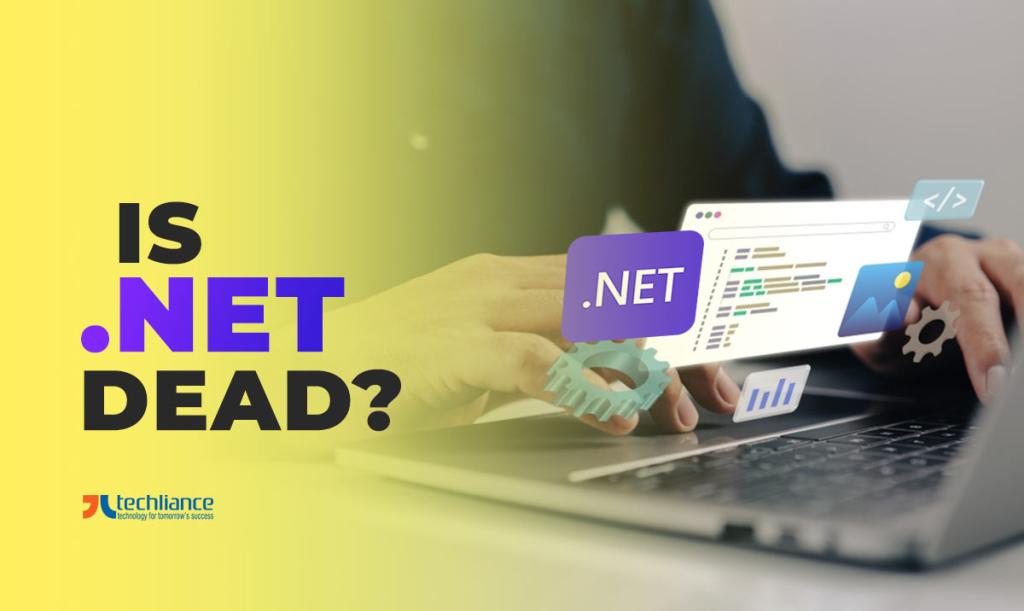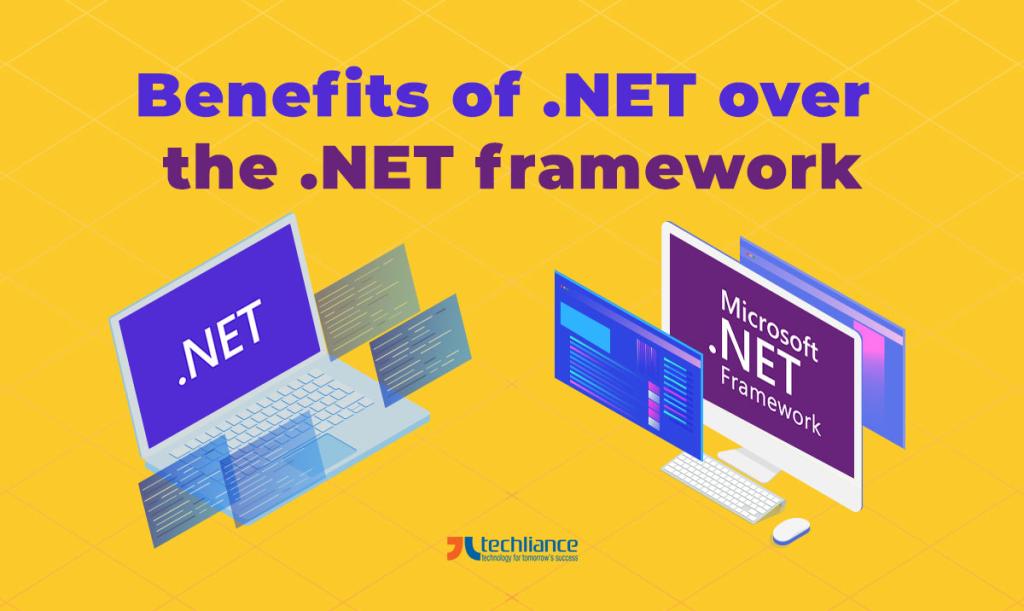The year 2024 is a year full of surprises and eventful situations that promise growth and expansion in technology. When it comes to programming languages, and tech platforms — two names have always stood out: .NET and Java. However, we are also witnessing debates like: is .NET dead?
Both of these technologies have been in the market for over two decades. Java and .NET hold extreme prominence and regard in the world of programming globally and in the United States. In particular, .NET coders are powering many web-driven, mobile, and enterprise applications.
We are on the brink of a possible inevitable AI invasion. As new technology trends are emerging, the .NET framework is under question in the eyes of businesses internationally. Is it certainly over for .NET?
One cool fact that iterates .NET framework is still prevalent is that about 7.9% of websites are using ASP.NET. Pretty cool, eh? The programmers unhappy with the lack of updates from the framework are glad with its successor, the .NET platform.
Of course, PHP kind of takes a huge lead with 78% of websites. Nonetheless, it does not undermine the fact that .NET is still very much in the game. With innovations like ML.NET and .NET MAUI, it is not ceasing to exist just yet.

Table of contents
- Goodbye .NET framework, hello .NET Core
- Is it time to mourn the .NET framework?
- Benefits of .NET over the .NET framework
- Reading the crystal ball for the .NET framework
- Union of .NET framework and .NET Core as the way forward
- Key takeaways
- Conclusion
- FAQs about .NET
Goodbye .NET framework, hello .NET Core
That’s what probably Joe Goldberg would say to the .NET ecosystem. And we will not disagree a bit. The .NET is a completely open-source, free, and cross-platform framework that can run on Windows, macOS, and even Linux.
Why do big tech companies stop updates to existing frameworks? They probably have bigger and better plans for technological continuity. That’s exactly what Microsoft was planning to do all along.
Back in 2016, Microsoft released .NET Core as a whole new era of .NET framework. Removing the “Core” branding, they renamed it to .NET in November 2020. It brings multi-platform capabilities to the development ecosystem.
.NET Framework 4.8 and 4.8.1 were the last fully functional releases brought out in April 2019 and August 2022. Moving it to some kind of retirement, Microsoft is not maintaining the .NET framework. Rather, the .NET is taking over the legacy framework.
Is it time to mourn the .NET framework?
The majority of industry experts are speculating that the .NET product lifecycle is coming to a close. As they say, all good things must come to an end. The official support for .NET Framework 4.6.1 has already ended back in April 2022.
.NET Framework 3.5 Service Pack 1 and .NET Framework 4.6.2 have support till 9 January 2029 and 12 January 2027. The .NET Framework 4.7 to .NET Framework 4.8.1 will have the end of support same as the parent operating system. So, the room for continuity of the .NET framework versions seems coming to a gradual halt.
This makes it a bittersweet moment for .NET developers who have been loyal to the framework. The legacy .NET framework is closing down with Microsoft gradually pulling the plug on the official support. So, it brings the questions like these.
Is it the time to take out the black? Has the time come to bid farewell? Is it time to move on?
Of course not, as its next manifestation .NET is already here.
Benefits of .NET over the .NET framework
The heading again gives Joe Goldberg feels but hey let’s stick to the point. Does taking over mean having all the features that the .NET framework has? Not really, but .NET is an improved version after all.
Many of the legacy systems of the original framework have been replaced or discontinued in the .NET Core. The underlying principle of .NET makes it more modern, highly usable, and lightweight in comparison to the .NET framework. Microsoft has broadened the spectrum from Windows-based software and web applications to multi-platform solutions.
Do you recognize the vastness of the .NET framework to .NET Core? For example, .NET has support for REST APIs, microservices using dockers, WCF services, CLI tools, etc. The majority of these features are absent in the .NET framework.
Whereas, .NET extends possibilities way beyond the typical web apps and Windows-centric software. .NET goes beyond traversing unexplored horizons of the web as well as mobile app development. So that companies can develop products that can have cross-platform capabilities.
Less cost, more room for expansion, and a greater ROI are other advantages of .NET Core. Do we need to say more? This is a complete game-changer.
Nevertheless, that means letting go of some of the framework features that could no longer comply with this use case. We have already covered the majority of the basics in the comparison of the .NET framework and .NET Core. So, you can catch up on all you need to know about .NET to ramp up your knowledge.

Reading the crystal ball for the .NET framework
Let’s have a crystal ball for the .NET framework and figure out what the future holds for it. We already know that Microsoft is withdrawing support for the existing versions of the .NET framework. Instead, they are focusing on making .NET more agile and powerful in subsequent market releases.
.NET 7.0 and 8.0 versions are delivering robust features building on the .NET framework’s features. Microsoft understands that technology trends are constantly evolving. It means having a greater capacity to incorporate ideas to pick up on changing times is a must.
As a result, .NET is focusing on the Internet of Things (IoT) and mobile application development in its recent versions. This open-source and cross-platform development platform has some amazing capabilities. Today, both .NET and ASP.NET are a decent choice for companies in the software market.
The following features of .NET are restoring the faith of enterprises, for using them in their products.
- Improved security
- Microsoft’s support
- Hot reload
- Improved performance across the board
- Unified platform for browser, cloud, desktop, mobile, and IoT
- Arm64 support
- C# 11.0, F# 7.0, and VB.NET 17.0 with language improvements
Union of .NET framework and .NET Core as the way forward
Do you remember the quote from Batman “Become who you are born to be”? That’s exactly what Microsoft is aiming for with the direction of .NET Core. It is replacing the legacy .NET framework but is not discarding the great features of the latter.
Because of this reason, .NET 5.0 took care of all that .NET Core 3.0 lacked. Some features that were included in .NET 5.0 are .NET web forms and Windows Communication Foundation (WCF). It led many ASP.NET development companies to use alternatives such as Blazor, gRPC, or CoreWCF respectively.
Microsoft’s product vision is to have a unification between the .NET Core and .NET framework. The latest releases of .NET Core are capturing the essence of the .NET frameworks. Accordingly, the developers don’t have to look elsewhere to substitute the missing features from the original platform.
For now, the struggle to engulf between the two is real. A lot of people from the .NET framework community talk endlessly about it. We are hopeful that the way forward is more about having a common ground.
So that the developers who have enjoyed legacy features don’t get disappointed. After all, they must have the leverage to get more out of the recent .NET platform. Don’t worry, as .NET possesses most of the abilities of the .NET framework.
The 2023 Stack Overflow survey found .NET 5.0 among the most admired other technologies with 70.23% votes. Whereas, 70.89% of developers disclosed their admiration for ASP.NET Core. This community patronage signifies how truly loved, sought-after, and commonly used .NET are ASP.NET are.

Key takeaways
- .NET framework has been one of the most popular development frameworks in the software market for over two decades.
- Powered by Microsoft, the .NET framework has seen great success with frequent versions and features.
- However, the .NET framework was lagging behind popular platform-agnostic technologies.
- Microsoft took remedial action by coming up with .NET Core to take over the legacy .NET framework.
- Now simply known as .NET, it is open-source and cross-platform in development support.
- However, some features of .NET were missing from the initial .Net Core releases.
- Microsoft is bridging the divide by having a middle ground between .NET and the .NET framework.
- This unification is bringing the missing features of the .NET framework to .NET gradually.
- The .NET framework is not dead, but it will eventually transition and merge with .NET Core.
- It gives developers the features that they need with wider coverage of technologies that are prevalent in today’s software development.
Conclusion
Remember that technology transcends, as it does not remain as is forever. After all, constant evolution is the only way ahead. In this perspective, the .NET framework is not dead but it will continue to operate in .NET Core’s form.
Although some significant differences do exist between the .NET and .NET framework. Microsoft is bridging the divide in the subsequent releases of .NET Core. So, .NET Core is thriving with continuous updates and is constantly maturing.
This is the time to hold on and wait for the eventuality to take over. The .NET Core is a greater adaptation of the legacy .NET framework. It comes with a wider coverage of features and a keen outlook on technology trends.
The world is constantly evolving with the cloud, 5-G, and cross-platform technologies. So, it’s time to buckle up and develop applications that have higher margins for adaptability with greater room for expansion.
Do you want to build a stellar online product? Come up with a solution in the market that stands at a par level against the competition. Make a connection with Techliance now to set off on your web project.

FAQs about .NET
Here are the frequently asked questions about .NET and their short answers.
What is .NET?
The .NET is a platform that lets you make a wide range of applications. Formerly known as the .NET Core, it is a successor of the .NET framework. It enables the development of web solutions for mobile apps to cross-platform applications.
How many languages .NET support?
Microsoft officially supports three languages — C#, VB.NET, and F#. However, you can work with several other programming languages such as C++ by porting in. The platform also supports ASP.NET technology for crafting web applications.
Is .NET easy or hard to learn?
The .NET has a high learning curve, making it difficult for beginners to use it. This can be time-consuming to develop software if you are a beginner developer. However, once you start getting the hang of it, you proceed to make the most of it quickly.
What can .NET be used for?
The .NET framework lets you create and run software applications based on the Windows platform. Whereas, you can build different kinds of applications in .NET that can operate on many operating systems and platforms. Even, you can develop mobile apps using Xamarin or its successor .NET MAUI as well.
Is .NET Core a multi-platform technology?
Yes, the .NET Core is a cross-platform technology. The .NET performs faster than any other popular framework through which you can write, run, and build on multiple platforms. It includes Windows, Linux, macOS, web, and mobile platforms.
About the author




